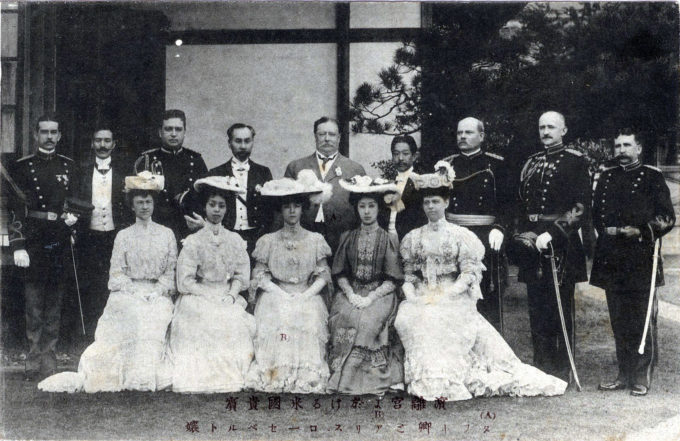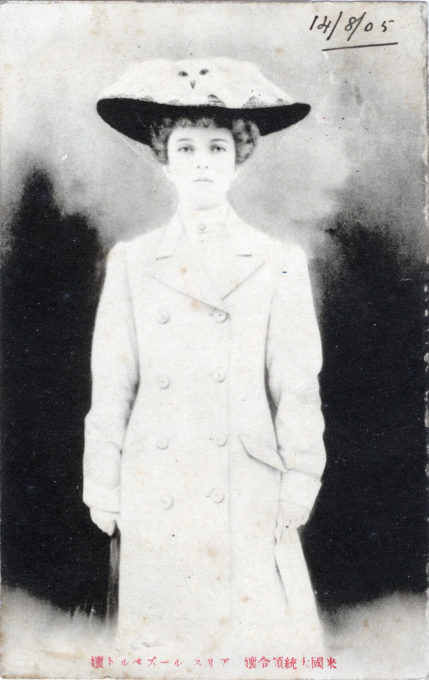
Secretary of War Howard Taft and First Daughter Alice Roosevelt (both at center, front and back), Japan visit, 1905.
See also:
Russo-Japanese War (1904-1905).
Japan-US Relations, c. 1908.
“General Grant” tree, Nagasaki, c. 1910.
“When [Secretary of War Howard Taft and Alice Roosevelt] sailed from San Francisco aboard the S.S. Manchuria that July 8 [1905], her father Theodore was trying to bring Russian and Japanese diplomats together to negotiate an end to a costly war. A few weeks earlier, the Japanese navy had virtually demolished the Russian fleet in the battle of Tsushima. From this position of strength, the Japanese government secretly asked Roosevelt to persuade the Russians to talk peace.
“While all this was going on, the irrepressible Alice was lifting the eyebrows of her older shipmates as they crossed the Pacific. She wrote later that she felt it her ‘pleasurable duty to stir them up from time to time.’ So she smoked when few ladies did, learned the hula in Hawaii, took a few potshots at passing targets with her pocket revolver and splashed fully clad in an onboard pool.
“By the time they arrived at Yokohama, the Russians and Japanese had agreed to talk, and anyone named Roosevelt was automatically a popular hero in Japan. The city welcomed them with flags flying and fireworks bursting. On the short trip to Tokyo, crowds at trackside chanted greetings.
Alice Roosevelt, daughter of U.S. President Theodore Roosevelt (1901-1909), souvenir postcard, 1905.
“For four days in the capital, the Americans were feted more grandly than royalty was usually treated. With countless bows and curtseys, they were presented to the Emperor and his family, and to Alice’s delight, she was loaded with gifts at every turn (‘I was a frankly unashamed pig,’ she wrote.). But she was not overly impressed by an exhibition of sumo wrestling (‘huge, fat,. . .men as big as Secretary Taft himself’).
“Presumably she did not know that while most of the party was being entertained, Taft himself was having unannounced conversations with Prime Minister Katsura. Those resulted in a memorandum of understanding that would remain secret for 20 years. In it, the two nations would acknowledge each other’s strategic interests in East Asia, with the United States recognizing Japan’s domination of Korea while Japan disavowed any aggressive designs on the newly acquired American sovereignty over the Philippine Islands.
“Thousands of paper lanterns lit the station in Tokyo as more shouts of approval sent the delegation off to the ancient Japanese capital of Kyoto, which staged a Cherry Blossom Festival for them although the blossoms of spring were long gone. Then, sailing from Kobe amid more fireworks, they bade Japan temporary goodbye after a brief stop at Nagasaki, a city that would figure in world headlines 40 Augusts later.”
– Global Diplomacy Was in Theodore Roosevelt’s Hands, But His Daughter Stole the Show, by Ernest P. Furgurson, Smithsonian Magazine, September 17, 2015


